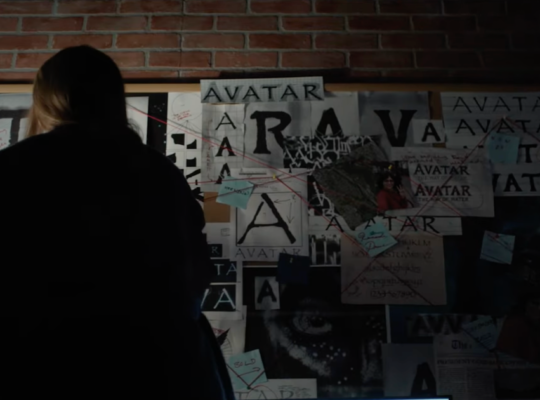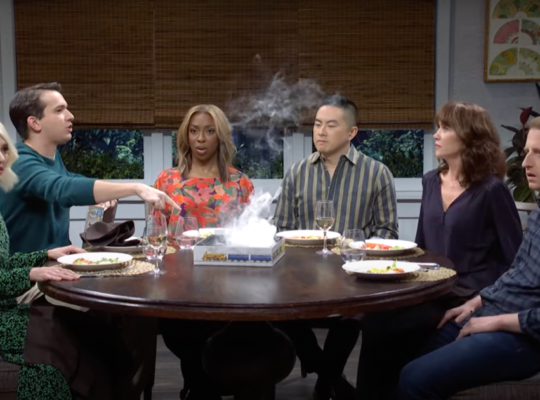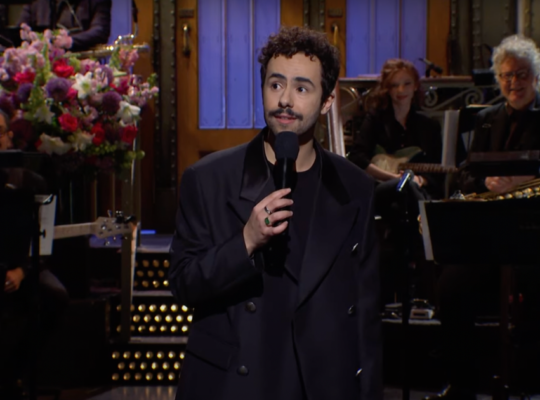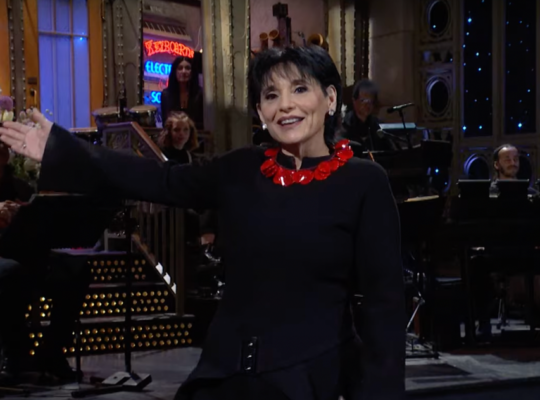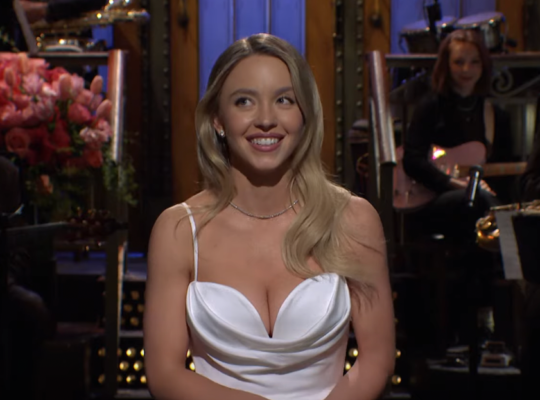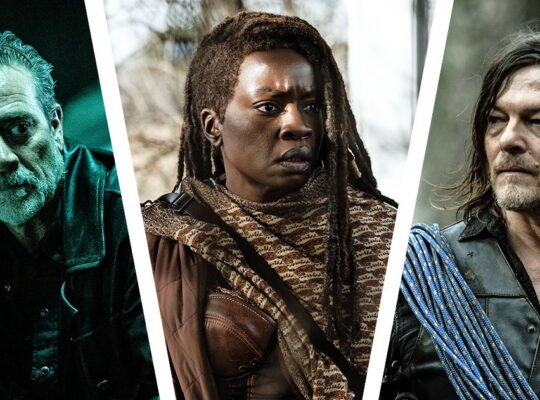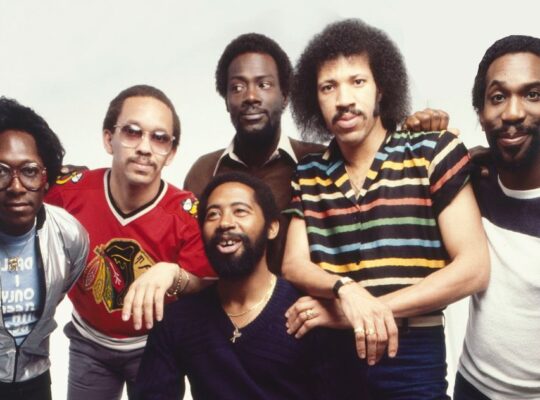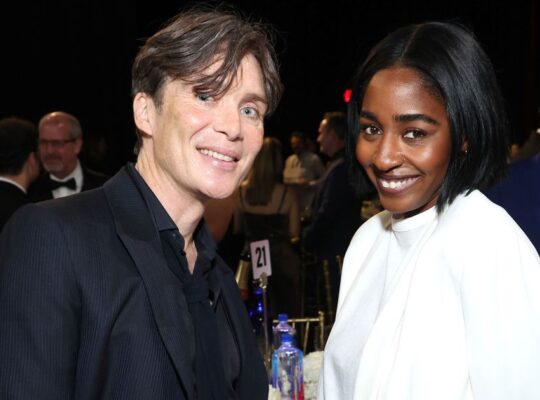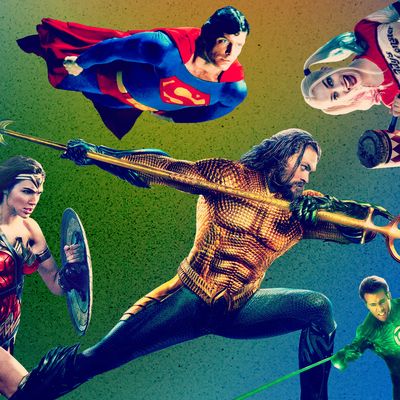
Photo: Emily Denniston/Vulture and photos courtesy of the studios
This list was originally published April 9, 2019. It has been updated to include new movies, including Aquaman and the Lost Kingdom.
The DC Extended Universe officially kicked off with 2013’s Man of Steel, but limiting the films made from DC Comics just to those (mostly uneven) films is to miss decades of history … decades with their own drama.
We had multiple sets of Batman films, a Superman arc that, because of corporate maneuverings, totally fell apart at the end, and two Swamp Thing movies. Alan Moore had his own wing, and of course don’t forget about the animated films, Keanu Reeves, Jonah Hex and Shaq. Also: Ryan Reynolds has some thoughts about his role in all of this.
For a long time, the DC Comics movies had no unifying thread, no Kevin Feige overseeing everything. This makes them vary dramatically in quality, but it eliminates any sameness: The bad movies are truly bad, but the ceiling is raised as high as a Christopher Nolan, Richard Donner, or Patty Jenkins can take it. It’s quite a journey, and it remains to be seen what new DC heads James Gunn and Peter Safran will bring to the table — after all these years, the company still seems to be trying to carve out a direction.
Today, we rank the 43 DC Comics movies — including this week’s Aquaman and the Lost Kingdom. (By the way, we intentionally left off films made from imprints later purchased by DC Comics. So sorry Hellboy, Road to Perdition, and A History of Violence: You’re excluded here.)
Christopher Reeve called this a “catastrophe from start to finish,” and if you don’t believe him — you should really believe Christopher Reeve, by the way, when he tells you a Superman movie is a “catastrophe” — you can try sitting through this bargain-bin, basement-price title, made by Cannon Films on a shoestring budget in which even the shoes and the strings don’t look real. Gene Hackman seems to realize immediately that he’s just signed up for a shitshow and hams it up in his final run as Lex Luthor, but nothing could save us from the monstrosity of Nuclear Man, a villain so lame that he’s never mentioned in DC canon again.
Writer-director Kenneth Johnson thought of his hero as a “blue-collar Batman,” and, you know, he’s not entirely wrong: If you took away everything that was cool about Batman and replaced all his tech with tin cans and garbage lids, you might have Steel. This film is widely derided today for its casting of Shaquille O’Neal as the hero, but Shaq, while wooden and cheesy, at least has enough natural charisma to escape mostly unscathed. Judd Nelson, as the villain (repeat: Judd Nelson as the villain!), is not so fortunate. The movie is pitched at the humor and dramatic level of a Bazooka wrapper, and it has roughly the same lasting impact.
“Batman vs. Superman is where you go when you admit to yourself that you’ve exhausted all possibilities. It’s like Frankenstein Meets Wolfman or Freddy vs. Jason. It’s somewhat of an admission that this franchise is on its last gasp.” A spot-on review of Zack Snyder’s abysmal 2016 team-up between the two iconic superheroes? Nope, that was what the screenwriter David S. Goyer himself told the Los Angeles Times back in 2005 about Warner Bros.’s previous aborted attempt to make this project happen. Goyer was right then, and he’s right now. Like his spiritual forefather Michael Bay, Snyder is a visionary action filmmaker who conceives blockbusters with an utterly original aesthetic and sensibility. And like Bay, that doesn’t mean they’re any good. The culture has already properly roasted Dawn of Justice’s stupid Martha business, but we’ve yet to fully absorb how much this film tarnished the legacy of Christopher Nolan’s Batman. His Dark Knight was a powerfully conflicted, reluctant hero. By comparison, Sad Affleck was just a dude encased in a metal suit.
May we humbly submit that the time might be right for a Catwoman solo film? A movie that’s willing to go into the darkest place of Batman, but with the pain, danger, and righteous fury of Catwoman, might have some legs in the current nightmare-scape in which we live. Still, overcoming the stigma of this DOA Halle Berry vehicle might be too tough to accomplish even 15 years later. The problem with Catwoman is that it never thinks about its character any further than “Halle Berry in a catsuit,” and while that might have its implicit appeal, Berry and the rest of the cast (particularly Sharon Stone as the villain) simply flail about. Another shot at this isn’t the worst idea, right?
This was the moment when a lot of people became concerned that George Clooney wasn’t going to be able to make the leap from ER hunk to actual movie star. And even now, when watching Batman & Robin, you’d be forgiven for assuming that this guy doesn’t seem destined to have a successful big-screen career. Indeed, the two-time Oscar winner’s worst qualities are on display here — chief among them, the off-putting glib attitude meant to convey cheekiness. Batman & Robin leveled the franchise, reducing it to ash. It was Batman’s low point … until Zack Snyder got his hands on him a couple of decades later.
The year of our Lord 2016 was a nightmare for Warner Bros. creatively in terms of its DC properties. Batman v Superman was awful, while Suicide Squad was only moderately better. (Of course, both films made a ton of money, so what did the executives care?) Suicide Squad beat Venom by a couple of years on this whole “What if a superhero movie … but bad guys?” conceit, bringing together a decent cast in Will Smith, Margot Robbie, and Viola Davis for a punk-rock action flick in which a group of criminals have to band together to defeat an even greater evil. Robbie has a ball letting loose as Harley Quinn, but Jared Leto’s monstrously irritating performance as the Joker strips away whatever meager merits Suicide Squad has. Turns out, End of Watch director David Ayer’s cynical brand of big-budget loud and stupid is just about as noxious as Snyder’s.
Before he was Thanos or even Deadpool’s buddy, Josh Brolin got into the comic-book game by playing Jonah Hex, a disfigured post–Civil War bounty hunter who can raise the dead, or something — it’s tough to keep it all straight in animator Jimmy Hayward’s muddled mess. You could maybe do a dark version of Jonah Hex in the Sin City style, and if allowed to go truly R-rated (like it might be today), you could perhaps have a supernatural Deadwood. Instead, you have this compromised, cobbled-together mishmash. Two positives: (1) the grinding, apocalyptic score from death-metal band Mastodon; (2) wow, that cast. Seriously, look at the actors in this movie: Brolin, John Malkovich, Will Arnett, Wes Bentley, Michael Shannon, and Michael Fassbender. (Oh, and Megan Fox.)
Before we get into the rest of it, Helen Slater was a perfectly passable Supergirl: She was strong and kind and good-hearted and charming in the role, and if she wasn’t exactly Christopher Reeve, heck, she came close. It’s a shame she has this movie surrounding her, which takes everything you liked about the first two Superman movies and runs it through a washing machine so many times that the S looks rinsed and beige. Suffice it to say, Peter O’Toole, in essentially the Marlon Brando part from the first film, does not comport himself nearly as well as Brando did … and Brando wasn’t that great in his entry either. (For that matter, Faye Dunaway is no Terence Stamp.) In an alternate universe, this could have been played for maximum camp and been a bit of a blast. This is not that universe.
All right, all right, we know that mocking Green Lantern has become its own cottage industry in recent years, not least of which by its star. And, yes, there’s a ton of cheese here, particularly when it comes to Peter Sarsgaard’s bizarrely phallic villain design. (His head is like a penis crossed with a Brussels sprout.) But seriously, not all of Green Lantern is terrible. The movie has a certain dorky good cheer that, particularly in the wake of Christopher Nolan’s Batman films (and especially now that we’ve seen Zack Snyder’s DC films), is almost sort of welcome? Green Lantern is earnest and bright and, yeah, incredibly silly and a little embarrassing. But it means well, and it turns out that Ryan Reynolds isn’t entirely without charm in the lead role. The movie isn’t good by any stretch of the imagination. But we’d watch it 40 times before we’d watch Batman v. Superman again.
Another in the long line of post-Matrix messianic, pseudo-superhero roles for Keanu Reeves, which is a big problem because the Hellblazer comic this film is based on has a lot more going on than just being a Reeves vehicle. The idea here, that a man damned to Hell for a suicide attempt in his youth exorcises demons to get back in the good graces of Heaven, has its pleasures, and you wonder if it might work as a Netflix series down the line (rather than the weak cable version we got a few years back). But this one is too rushed and too poorly thought through to reach the heights you want it to.
It doesn’t matter how many times you watch it: It is never ever not surreal to see Richard Pryor show up in a Superman movie. The bummer part is that it’s stunt casting top to bottom: The movie never lets Richard Pryor be anything but Richard Pryor the celebrity, rather than Richard Pryor the comic, and thus it neuters him and makes him entirely boring. Robert Vaughn is a particularly pallid villain, and the movie’s case against computers, uh, hasn’t aged too well. It is fun to watch Superman in a bar though. “Hey, look, Superman’s drunk!”
A movie marred by tragedy — Zack Snyder, who had to leave mid-production because of the death of his daughter, was replaced by Joss Whedon — Justice League feels very much a collection of bits and pieces, a litany of reshoots and warring sensibilities all fighting for attention. The film’s bright spot is Wonder Woman, although Gal Gadot isn’t nearly as magnificent as she was in her solo film, which came out a few months earlier. Do we remember anything of the plot? Not really: Basically, a bunch of joyless dudes (and an Amazonian princess) battle Steppenwolf, who wants to enslave the universe or something. Between the half-hearted wisecracks and Henry Cavill’s freaky digitally erased mustache, Justice League collapses under its own weight. This movie was meant to be DC’s epochal Avengers-like moment. Instead, it was completely forgettable.
The seminal Alan Moore comic got an animated adaptation that ended up making more news for a scene in which Batman and Barbara Gordon get it on. That actually exacerbates a problem in the original comic, in which Barbara Gordon is sexually assaulted by the Joker’s goons, but it’s only taken as seriously as is required to raise the stakes for Batman. (The old “fridging” problem.) The movie isn’t weighty enough to take on all this subtext, and it ends up making you uncomfortable in the wrong ways.
The first post–Tim Burton Batman has hints of the disasters that would be coming — the bat nipples, Joel Schumacher’s mostly glib, cartoonish vibe — but it never veers entirely into Mr. Freeze land. Val Kilmer cuts an excellent cowl, Nicole Kidman enjoys a rare vamping role, and even Jim Carrey carries some legitimate hellzapoppin’ menace as the Riddler. The less said about Tommy Lee Jones as Two-Face the better, and this was certainly a step in the wrong direction for the franchise, but it’s not the fiasco its follow-up would be.
So this is it. This is the end of the DC era that started with Man of Steel. Jason Momoa’s Aquaman was the burliest, broiest member of the Justice League — the guy you’d most want to have a beer with — but his presumed final film in the franchise is a just-okay epic in which he and former nemesis (and half-brother) Orm (Patrick Wilson) team up to fight Black Manta (Yahya Abdul-Mateen II). What was appealing about the 2018 film — its goofy sense of humor, its willingness to cast people like Dolph Lundgren to play an underwater king — is less endearing this time around, especially when the rest of the trappings are so familiar from approximately 15,634,523 other comic-book flicks. DC is going in a new direction after this sequel, which is obvious considering the studio showed it to critics as late as humanly possible. That might suggest Aquaman and the Lost Kingdom is a fiasco, which it isn’t. But DC executives want you to forget about Momoa as they prepare for an ambitious restart of all their properties at precisely the moment when the world is starting to cool on superhero cinema. We don’t envy them having to take on that task.
The great pity about Man of Steel is that it never lived up to its terrific theme song.
Consciously moving away from John Williams’s equally terrific theme for the Christopher Reeve films, Hans Zimmer gave us a sense of Superman as a mighty, courageous figure — maybe a little darker than the Man of Steel that Richard Donner had conceived in the 1970s, but still a noble, powerful force of good. Unfortunately, except for some stirring segments, Man of Steel fails to craft a story worthy of its character. Essentially re-creating Superman’s origin story while inserting Superman II’s bad guys, Zack Snyder’s first go-round with the Kryptonian is a typically self-serious, lumbering affair. Henry Cavill is better in the role than he was given credit for at the time — nobody was going to replace Reeve in our mind — but very fine actors like Amy Adams and Michael Shannon are utterly wasted in beloved roles they fail to make their own.
How much should vision count when evaluating a superhero movie? If nothing else, Zack Snyder’s restored, expanded, exhausting Justice League leaves no doubt that it’s the movie he wanted to make. No studio interference, no Joss Whedon adding his own sensibility: This 242-minute totem is the purest expression of the maximalist filmmaker’s mythic take on the gods who roam the land, utilizing their incredible powers to protect us puny humans. If you find such a self-serious approach laughable, well, tough: Snyder is unabashed in making us kneel in awe as Batman & Co. face off against their greatest foe. Beyond offering more pumped-up action, this version does actually make Cyborg an interesting character and, truly, there’s never been another comic-book movie quite this epic, although its inherent limitations suggest why that’s not necessarily a good thing. (At any length, the story is silly, and our heroes aren’t as engaging as they are in their standalone films.) This imperfect, ambitious miss is undeniably fascinating, but all told, we’re hoping that Warner Bros. doesn’t allow Snyder to make sequels to it. Part of what makes this film so captivating is knowing that it’s a skillfully executed fool’s errand — a vision of a DC universe that no one else could possibly (or perhaps sensibly) dare to live up to.
In the wake of The Matrix, Lana and Lilly Wachowski were so hot that although they only wrote and produced V for Vendetta, many assumed they directed the film as well. C’mon, “James McTeigue” had to be an alias, right? But no: McTeigue, an assistant director on the Matrix films, made his feature debut on this big-screen redo of the Alan Moore/David Lloyd comic. (Moore, it will not surprise you, hated the film, requesting his name be taken off the adaptation.) There’s no question that the movie has a stylish, vaguely revolutionary tone — it’s mildly radical for a 21st-century studio offering — and Natalie Portman and Hugo Weaving are sufficiently engaging as, respectively, a burgeoning insurgent and the terrorist who kidnaps her. At the same time though, V for Vendetta’s politics aren’t more sophisticated than “Hey, man, shit’s fucked up,” and the filmmakers’ pride in their not-very-edgy stance gets awfully tiresome.
Because it had a pulse — something Batman v Superman or Justice League couldn’t claim — Aquaman was probably a bit overrated when it came out; critics and audiences were just so grateful not to have to suffer through another mope-fest that they’d happily accept an ultragoofy underwater adventure that’s part Raiders of the Lost Ark, part palace-intrigue drama. Jason Momoa makes for a pretty cheerful buff-bro Aquaman, and Furious 7 director James Wan cranks everything to 11, piling on the over-the-top imagery and spectacle until you burst out laughing or simply succumb to the whole ridiculous onslaught. Aquaman is spirited without ever being particularly good. Nevertheless, its relative high placement on this list indicates how often DC has done worse.
The charm of the 2019 original hasn’t gone missing in Fury of the Gods, but a certain amount of sequel-itis has set in, which dooms a franchise that really needs to be spry in order to offset the fact that few movie fans were familiar with this character. Zachary Levi returns as Shazam. This time, he’s doing battle with Lucy Liu and Helen Mirren (all-powerful gods who want to harvest his superpowers) and the emphasis is on family — a point driven home, not very amusingly, by the characters sometimes referencing the Fast & Furious flicks. The sweetness and no-big-deal spirit of the first film remains, and Levi’s enthusiasm is infectious: He makes being a superhero look like a blast. Nevertheless, Fury of the Gods is one of the last DCEU films to come out before the new DC Studios regime takes over, and on the whole, it represents what has been lacking in these recent installments. It feels like it’s playing catch-up with its competitors — always a step behind, never entirely forging its own identity.
In recent years, Dwayne Johnson has pivoted to being fun and lovable — the wisecracking, adorable bodybuilder next door — so it’s a twist to see him get all gloomy and grumpy for this so-so spectacle in which he plays Teth-Adam, an ancient slave reborn in modern times as a god. We’re not surprised Black Adam originally had an R rating — Johnson’s antihero doesn’t care who dies because of his actions — and despite the trims director Jaume Collet-Serra made to get a more family-friendly rating, the movie still feels more frank in its depiction of violence than you normally see in comic-book flicks. So much of Black Adam is familiar — for instance, the Justice Society is like the X-Men but less memorable — but this has been well-cast, with everyone from Sarah Shahi to Aldis Hodge to Pierce Brosnan giving the material a little extra layer of gravitas. This probably won’t be anybody’s favorite Johnson film — like too many origin stories, it mostly exists to create the foundation for future sequels — but the movie at least makes good use of the man’s intimidating build. If nothing else, you’d be curious to see this guy square off with Superman — which is never going to happen now.
For a while, it seemed a given that we’d never see this movie — Ezra Miller’s troubling off-screen issues made that nearly a certainty — but now that The Flash has arrived, it’s neither the comic-book masterpiece the studio insisted it was nor a dull retread of so many standalone superhero movies that came before. Miller proves to be a likable, empathetic presence as Barry Allen, who uses his powers to go back in time, altering the past to save his parents from their tragic fate. No surprise, there are consequences to those actions, and the film does a decent job traipsing through the multiverse, bringing our young hero face-to-face with a Batman he doesn’t know, one played by none other than Michael Keaton. There’s plenty of fan service, naturally, but The Flash is more emotional than your average DC offering, helped by strong performances from Ron Livingston and Maribel Verdú as Barry’s parents. But it’s telling that the film wouldn’t be nearly as gripping without Keaton. Once the Dark Knight, always the Dark Knight.
It is an indictment of the DC Extended Universe that this likable lark is one of the best films of this newish series … and yet it’s still not that great. Zachary Levi is grand fun as the adult superhero that teen orphan Billy (Asher Angel) turns into whenever he shouts “Shazam!” Jack Dylan Grazer is a delightful sidekick. And the movie has a real sweetness and sincerity to it, determined to give family audiences a superhero flick that’s not all ponderous brooding and dark origin stories. But that doesn’t keep Shazam! from feeling a bit formulaic. Mark Strong’s menacing villain is a bit of a drip, and the finale devolves into CG overkill. Nonetheless, director David F. Sandberg delivers a decent-enough ride for a first installment.
It’s probably best to think of this as a softer, less manic, less funny but still fine version of The Lego Batman Movie: That’s clearly what the filmmakers (and DC proper) were going for. The premise — that Krypto (Dwayne Johnson) has to team up with animals with special powers (voiced, amusingly, by Kevin Hart, Natasha Lyonne, Diego Luna and Vanessa Bayer) to save the Justice League — is more cute than clever, and the jokes are pitched closer to the level of a Illumination movie than, say, the fantastic (and much more adult) HBO “Harley Quinn” series. Those pets are really cute, though, and any movie that casts Keanu Reeves as Batman and Marc Maron as Lex Luther has its heart in the right place. This is fine enough, though we guarantee you the sequel’s going to be a lot worse.
That Harley Quinn’s spinoff is far superior to Suicide Squad is unsurprising: After all, it’s more about her and a whole hell of a lot less about everything else that was terrible about that 2016 film. Margot Robbie has given better, more nuanced performances, but she seems to absolutely love playing this twisted sociopath, who this time teams up with a local street tough (Ella Jay Basco’s Cassandra Cain) to protect a rare diamond from a ruthless mobster (Ewan McGregor). When Robbie’s onscreen, her character taking such delight in all the mayhem she causes, the film is a gas. Unfortunately, it’s not called Birds of Prey for nothing: Director Cathy Yan’s superhero movie means to introduce that team of renegade, all-female superheroes. Give the film major points for being far more diverse and female-centric than most comic-book flicks. But the annoying truth is that the Birds of Prey weigh down Birds of Prey. Harley had to split time with less interesting characters in Suicide Squad — why make her do it again?
We know it’s cheating a little to put these two movies together, but jeez: They’re two Swamp Thing movies, and they’re both roughly similar in quality, so here they are. The first one is a little more straitlaced and straightforward. Directed by Wes Craven, it’s just a story of a nice guy (Ray Wise!) turned into a monster who attempts to take revenge on the evil scientist who made him that way. The movie has some spooky midnight thrills and a very game Adrienne Barbeau, but it’s mostly conventional. The sequel is pretty much a comedy, which might not be true to the comic but, well, probably makes a little more sense. They both work equally well, which is “just a little.” The downgrade from Barbeau to Heather Locklear in Return of Swamp Thing, however, is substantial.
It’s a little poignant (and ironic) that one of the final films before the James Gunn/Peter Safran era gets rolling is one of the better installments. Initially planned for release on what was then called HBO Max, Blue Beetle repeats a lot of the origin-story stuff we’re familiar with from other superhero adventures, and to be sure those beats are the least interesting elements here. But what’s winning are the very likable characters and the sense of culture and history that the film exudes. Cobra Kai’s Xolo Maridueña plays Jaime Reyes, a college graduate heading home to be with his working-class family amid an uncertain future, unexpectedly encountering an alien scarab that turns him into the titular crime-fighter. Charm City Kings filmmaker Ángel Manuel Soto invests the story with plenty of humor, but the movie also features a superb veteran Latin American cast, including Damián Alcázar and Oscar nominee Adriana Barraza, to critique racism, gentrification, and economic inequality, making Blue Beetle far more of a legitimate underdog tale than we typically see in superhero fare. And at a moment when the Fast and Furious movies’ celebration of family has turned into self-parody, this warm, emotional movie is actually touching in its portrait of a community bonding together to defeat the rich, callous outsiders (portrayed here by Susan Sarandon). Blue Beetle probably won’t do well, hurting the character’s chances for a future in the DC Extended Universe. That’s a shame, because unlike other DC properties, this one actually seems to have potential.
What if Superman III and Superman IV never happened? What if you just made a new movie that took place after the events of Superman II? Predating the “direct sequel” phenomenon, Superman Returns revisited the openhearted spirit of the first two Superman films, casting relative unknown Brandon Routh to channel the spirit of Christopher Reeve in the dual roles of Superman and Clark Kent. Quite often, Superman Returns is a poignant homage and a melancholy reminder that the era that birthed the original Superman movies is long gone. At its best, the film leans into that reality, giving us a story in which Clark tries to repair past mistakes he’s made with Lois Lane (Kate Bosworth). Ambitious, uneven, filled with feeling, Superman Returns ultimately couldn’t compare to the early Reeve pictures, but the attempt is touching.
Zack Snyder’s insistence that his Watchmen movie would be so loyal to the comic that it would be nearly a shot-for-panel remake was an odd one. But considering what Snyder would do when he started adding his own special sauce to comic-book movies, maybe he should have tried this approach more often. The film doesn’t have the apocalyptic menace of the graphic novel, but there’s enough good stuff here that it still works; Jackie Earle Haley’s Rorschach, in particular, maintains much of his furious power. The best bet remains the opening credits sequence, which portends a better movie to follow. That movie doesn’t quite get there, but it still might be the best sequence Snyder’s ever done.
Wonder Woman was such a kick that it’s perhaps inevitable that the follow-up couldn’t recapture the magic. (Add to that the fact that 1984 was one of the first major studio movies to appear during the pandemic, unreasonably raising expectations for blockbuster-starved audiences.) But all told, the sequel is actually pretty solid. Not just set in the ’80s but embodying the tenets of ’80s films — there’s even a body-switch comedic subplot — 1984 is, at heart, an earnest story about doing good in the world, which consciously feels out of step from the overblown, galactic life-or-death stakes we’ve come to expect in superhero cinema. The chemistry between Gal Gadot and Chris Pine isn’t as palpable this time, and once again we have a Wonder Woman movie with mediocre villains. But the stirring decency of Diana remains this franchise’s chief appeal. How can you not root for her?
Christopher Nolan’s first two Batman movies were so paradigm-shifting, so overwhelming, that it was probably impossible for this third film to match either of them. The plot’s a little conventional, it’s more fanboy comics-centric, and the bombast and scope sometimes outpace everything the movie has to say. (The whole Occupy Wall Street subplot feels like an empty feint.) But this is still grand blockbuster filmmaking: The scene where bombs explode across Gotham is as memorable and terrifying as anything in the series. Nolan doesn’t wrap the trilogy up perfectly, but that doesn’t mean The Dark Knight Rises still isn’t powerful … and even fitting. He’s moved on, but the rest of us still can’t.
It’s possible that no human being has brought up this movie in conversation without thinking they’re the first person to add, “And you know, Mark Hamill is actually the best Joker.” We won’t go that far, but he’s pretty great in Mask of the Phantasm, the big-screen version of the popular animated series of the early ’90s. Kevin Conroy voices Bruce Wayne, who must reconcile with his past in several ways. (Dana Delany voices Andrea Beaumont, a former lover who walks back into Bruce’s life.) Like the series, Mask of the Phantasm does a nice job of catering both to kids and adults — this isn’t as intense as the Christopher Nolan films or as kinky as the Tim Burton movies, but it’s smartly written and respectful about what makes the Dark Knight such an evergreen character. As for Hamill, he finds his own twist on the Joker’s maniacal laugh and demented psyche — no easy feat, as Jared Leto could tell you.
Forget, if you can, James Gunn’s dumb comments about Martin Scorsese and superhero movies. The proof that the Guardians of the Galaxy auteur can turn comic-book material into legitimate cinema is right there on the screen, as he transforms a collection of DC’s most rascally criminals into a rousing team of antiheroes who take on a terrifying starfish-like beast known as Starro. Much like the film that’s coming up next on this list, The Suicide Squad is a comic-book movie for grownups, giving us plenty of adult humor and graphic violence along with a wised-up sense of what the real world would be like if, say, Harley Quinn were allowed to roam free. Margot Robbie has never been so unbridled, and Idris Elba finally gets the tentpole starring role he’s always deserved. (He does weary and rugged as good as anyone.) Rather than echoing the doom-and-gloom aesthetic of Zack Snyder, Gunn comes up with his own visual language that’s fresher and more stunning. Playful but compelling, snide but oddly sincere, The Suicide Squad represents a promising new direction for R-rated superhero films. Now if Gunn can just keep his Scorsese comments to himself.
If nothing else, Joker accomplishes something that seemed nearly impossible in the post-Nolan era: It’s a DC film that actually feels relevant, inspiring debate, discussion, and controversy, a shocking turn of events after years during which the studio produced largely anonymous product that resided in Marvel’s imposing cultural shadow. Then there’s the movie itself, which manages to accomplish what it sets out to do: create a backstory for the Joker that both shows how he became such a horrifying figure and illustrates the brutality of the evil that he inspires in the world. Joaquin Phoenix is exceptional as Arthur Fleck, the troubled would-be comic who will find his calling in the most terrible of ways, and it’s a performance full of jittery intensity. There’s nothing about Joker that forgives or champions Joker’s behavior, and while the whole movie may not be as terrific as its most inspired sequences, Phoenix and director Todd Phillips capably present a new way to think of this monster. When Phoenix won the SAG Award earlier this year, he said, “I’m standing here on the shoulders of my favorite actor Heath Ledger.” That the two depictions of Batman’s greatest foe can stand toe-to-toe is a testament to how much Phoenix brought to the role: You can absolutely see his Joker as the horrible first inklings of the man that Ledger embodied in The Dark Knight.
At this point, it’s probably impossible not to make a Batman movie that’s jet-black despairing — unless, of course, you’re intentionally going in the exact opposite direction, such as Will Arnett’s satiric take on the Caped Crusader in the Lego movies. So give War of the Planet of the Apes director Matt Reeves credit for finding his own way into Gotham’s luminous gloom, presenting us with a young-ish Bruce Wayne (Robert Pattinson) who’s still relatively new at being Batman, still making mistakes while honing his skill at crime-fighting. A grandiose noir infused with the bitter soul of a detective novel, The Batman might be the most enveloping of all DC films — you can practically feel the rain and societal decay on your skin — and is even more adult than Christopher Nolan’s trilogy. But the darkness has its share of light, whether it’s Pattinson’s broodingly optimistic spin on the iconic character or Colin Farrell’s amusing turn as the Penguin. This will probably not be anyone’s favorite Batman movie, but it’s a worthy new chapter. If anything, at three hours, it’s not long enough.
“The Joker’s flamboyant. Batman wants to remain in the shadows.” That’s how Tim Burton described the key combatants in his 1989 blockbuster, which created the template for the modern superhero film — one in which darkness, vivid production design, and moody characters would reign supreme. Michael Keaton was all icy remove, while Jack Nicholson told all his previous extreme roles to hold his beer so that he could give us a supervillain that was pure ham. Not all of Batman has held up. (Danny Elfman’s score remains stirring, but genius that he was, Prince feels a little out of place on the soundtrack.) Nonetheless, Burton’s grand vision of how to translate a comic-book aesthetic onto the big screen remains stunning. Other DC movies rank higher on this list, but they’re all indebted to what Batman dared to dream.
The last Batman movie they’d ever let Tim Burton do, and that seems to have been entirely Burton’s intention. This is aggressively weird and occasionally off-putting — Danny DeVito’s Penguin is just flat-out gross — which is the opposite of what Warner Bros. wanted from its sequel to one of the biggest movies of all time. But this is still when Burton had his fastball, and it’s thrilling to watch him exorcise some of his personal demons on this grand of a stage. These are all misfits and outcasts back when Burton still felt that way himself, and you feel their isolation, most notably in Michelle Pfeiffer’s iconic Catwoman, who strikes back with furious vengeance. Batman is more beloved, but Batman Returns is arguably more memorable.
Marvel has eaten DC’s lunch for years, but Warner Bros. can always hold this over its competitor’s head: It made the first female-driven superhero flick of this modern superhero era that was directed by a woman. However, those distinctions don’t do justice to Wonder Woman, which made Gal Gadot a superstar, and deservedly so. Her portrayal of Diana gives this Amazonian princess the proper regal bearing, but Gadot proves to have a wonderfully wry sense of humor as the character continues to be amazed at how weird male mortals are. Director Patty Jenkins mounts a few superb action sequences — Wonder Woman’s World War I battlefield gauntlet is an all-timer — and Chris Pine is a pitch-perfect romantic foil. After Wonder Woman, moviegoers weren’t necessarily clamoring for any more Superman or Batman films. We just wanted more of her.
Later in life, Christopher Reeve explained the trick to playing the Man of Steel. “Superman is a big fish in a small pond,” he told Esquire. “He’s Superman on Earth only because he’s in a different solar system. If he’d grown up on Krypton, if Krypton had not been destroyed, he might have been average — nothing special about him. That allowed me to underplay the character and make him quite casual.” Among its other attributes, Superman is shot through with a winning modesty, embodied by Reeve’s no-big-deal depiction of Superman. Probably no superhero movie since has articulated what a privilege it would be to find out you had incredible powers. Director Richard Donner chronicles Kal-El’s origin story with awe, eventually introducing us to one of the best cinematic villains in the dastardly, smart-ass Lex Luthor (Gene Hackman). This movie could not be made now. It’s too square. Too corny. Those are some of the reasons Superman remains so special.
Here’s where Christopher Nolan fully established that he wasn’t going to be typecast as merely a crafter of clever little puzzle movies. Batman Begins resurrected the Dark Knight from the trash bin of cinematic history, erasing people’s memory of the Joel Schumacher atrocities but investing more fully in the dark perspective on the character that Tim Burton’s movies merely hinted at. Christian Bale wasn’t an obvious Bruce Wayne — he’d previously played a very different kind of wealthy weirdo in American Psycho — but he brought the right amount of gravitas to the role so that Batman Begins wasn’t less interesting when the superhero took the suit off. Add to the mix Liam Neeson as an underrated Dark Knight nemesis and you’ve got one of the finest origin stories ever conceived. And, of course, Nolan was just getting started.
In the annals of big-budget rescue jobs, Superman II is high on the list of success stories. Initially meant to be filmed simultaneously with the first installment, the sequel faced internal battles, forcing initial director Richard Donner to be booted from the project. Enter Richard Lester, who had to take over the movie, as well as reshoot already existing material. Remarkably, Superman II shows little sign of its difficult birth. Here’s where Supes declares his love for Lois Lane (Margot Kidder), who comes to discover his true identity. It’s the film that let the fearsome Zod (Terence Stamp), who was briefly shown alongside his evil chums in the 1978 original, strut his stuff. Inconceivably, Superman II is even more thrilling and stirring, not to mention touching and romantic, than its predecessor. If only Reeve and company had decided to stop there.
“If you’re good at something, never do it for free.”
“You either die a hero or you live long enough to see yourself become the villain.”
“He’s the hero Gotham deserves, but not the one it needs right now.”
“Some men aren’t looking for anything logical. They can’t be bought, bullied, reasoned, or negotiated with. Some men just want to watch the world burn.”
Beyond being one of the most indelible of all superhero movies, The Dark Knight might be among the most quotable. (And we haven’t even mentioned the film’s most iconic line, “Why so serious?”) Raising the bar after the stellar Batman Begins, director Christopher Nolan dissected the very nature of heroism, evil, and sacrifice for this second installment, and in Heath Ledger we had the greatest of all Jokers — which is to say the most inexplicable and, therefore, most terrifying. Before The Dark Knight, comic-book movies were mere playthings, enjoyable but disposable entertainments. After The Dark Knight, they were held to a higher standard. After all, if Nolan could make this, there was no excuse for superhero movies not to be ambitious, nuanced, and mesmerizing. DC has stumbled often since The Dark Knight, burdened by the long shadow this film created. But no superhero movie, from any company, has ever topped it.
Grierson & Leitch write about the movies regularly and host a podcast on film. Follow them on Twitter or visit their site.




